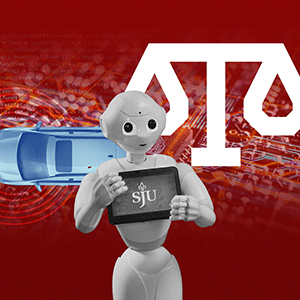Kinney Center for Autism Education and Support
Preparing Adolescents with Autism for College and Careers

While diagnosis and early intervention programs are readily available for children with autism spectrum disorder (ASD), support services drop off for teens and young adults.
“There’s such a focus on children, but then those kids grow up and need transitional services,” says Theresa McFalls, LSW, interim executive director of the Kinney Center for Autism Education and Support. “So, it’s thinking about what’s next for them, whether that be employment or college.”
McFalls says unemployment rates for people on the spectrum are staggeringly high: 85% to 90% compared to the national average of 3.7%. And of the individuals with autism who attend college, less than 40% graduate.
That’s why Kinney is expanding its transitional services to prepare adolescents for vocational and college experiences. This year, the Center partnered with local school districts to help alleviate the gap in services for young adults, ages 14–22.
“One of the challenges this population could face when obtaining employment is self-advocacy,” says Chloe Grieshaber, BS ’23, MS ’25, graduate assistant in the Kinney Center who works with clients in the transitional program.
Transitional services for these young adults include individualized skills development, like self-advocacy, on-campus internships and paid positions with a job coach, evaluation in Kinney’s Practical Assessment Exploration System (PAES) Lab to identify interests and abilities, exploration of majors and career paths, and more.
Already, Kinney has matched newly enrolled students with on-campus jobs, including Saxbys, the Writing Center, Athletics and more. And for students enrolled in ASPIRE, Kinney’s program for college students with ASD, the graduation rate is double the national average, with 50% of students gaining competitive employment at jobs that match their skills and interests compared to 6% nationally.
Both initiatives are further proof that teens and young adults with ASD need — and succeed with — continued support services.
“And we’ve developed training modules for employers interested in learning the benefits of a neurodiverse workforce,” says McFalls. “So we not only provide training but also have these great clients who have stepped into new roles as a result.”
In addition to offering services for employers, Kinney also launched a new caregiver program this year, providing loved ones with resources and a community of support.
“Mental health is a very big topic in the autism community, but we also need to think about the caregivers,” says McFalls. “Sometimes their needs are overlooked and forgotten.”
Kinney’s suite of programs for individuals with ASD, their caregivers and future employers continues to grow as they approach their 15-year anniversary and expand their capacity to support the autism community.
“We just had our first student offered a full-time job before he graduated,” says McFalls. “We've really increased our corporate partners of people who are hiring ASPIRE interns and then we're seeing that turn into full-time employment. It’s been great.”
There's such a focus on children, but then those kids grow up and need transitional services. So, it's thinking about what's next for them, whether that be employment or college.”
Theresa McFalls, LSW
Interim Executive Director of the Kinney Center for Autism Education and Support


